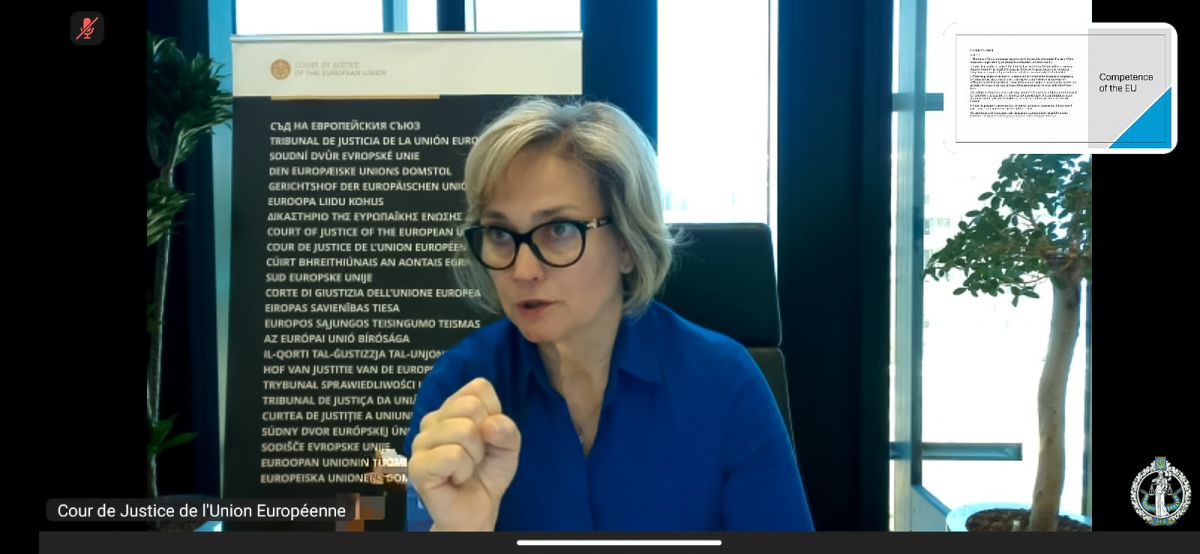June 12, 2025
Today, on June 12, judges of the Constitutional Court of Ukraine Viktor Gorodovenko, Alla Oliinyk, Oleg Pervomayskiy, and Galyna Yurovska had a meeting with Judge of the Court of Justice of the European Union, Judge of the European Court of Human Rights (2005-2014), President of the Constitutional Court of the Republic of Latvia (2017-2020) Prof. Ineta Ziemele.
The event was held within the framework of a joint educational project of the Constitutional Court of Ukraine and the National School of Judges of Ukraine, launched in April 2022. The aim of the project is to promote legal culture through direct communication between judges, national and international experts and the legal community, as well as with a wide audience interested in constitutional jurisdiction and the functioning of state institutions.
In her presentation on the EU Constitutional Order and National Constitutions, Ineta Ziemele outlined the key aspects of the interaction between national law and the law of the European Union, focusing on the importance of national identity, the principles of subsidiarity and proportionality, and the role of constitutional courts.
The speaker stressed on the issue of national identity of the European Union member states on the example of the Republic of Latvia.
She noted that the Constitution of the Republic of Latvia defines it as a democratic, socially responsible state based on the principles of the rule of law, respect for human dignity, freedom and human rights.
According to the judge, Latvian identity is based on language, cultural traditions, and universal values such as honesty, justice, family principles, and responsibility to future generations. This approach ensures social cohesion and promotes harmonious development within a united Europe.
The speaker paid special attention to the principle of respect for the national identity of the European Union member states, enshrined in the Treaty on European Union. The judge emphasised that the EU recognises the uniqueness of each member state, respects their national identity, constitutional system, political organization, as well as regional and local self-government.
Judge Ziemele also pointed out the importance of the principles of subsidiarity and proportionality, according to which the European Union takes measures only in those areas where the objectives cannot be sufficiently achieved by the Member States at the national, regional or local levels. Adherence to these principles ensures that the balance between the EU institutions and the Member States is maintained, and their implementation is provided for in the relevant Protocol, which, in particular, provides for the participation of national parliaments in monitoring compliance with these principles.
The speaker paid special attention to the role of constitutional courts in the application and interpretation of EU law, and provided examples of practical interaction between the judgments of the Court of Justice and national legislation. She emphasised that, despite the binding nature of the EU Court of Justice's judgments on Member States, constitutional courts retain a crucial role in ensuring the supremacy of the national constitution and maintaining a balance between European obligations and national sovereignty. She highlighted constitutional courts should be proficient in interpreting EU law and provided examples of relevant case law.
The judges of the Constitutional Court of Ukraine expressed their sincere gratitude to Judge of the Court of Justice of the European Union Ineta Ziemele for her thorough and informative presentation, which combined a deep theoretical analysis and a practical dimension of the application of EU law.
They emphasised the importance of continuing such a professional dialogue to improve legal culture and strengthen mutual understanding between national and European constitutional review institutions.
The event was also attended by the staff of the Constitutional Court of Ukraine, judges of the courts of the judiciary, lawyers, academics, teachers, and students, postgraduates of higher education establishments and students of the Junior Academy of Sciences.
The video recording will be available soon.




